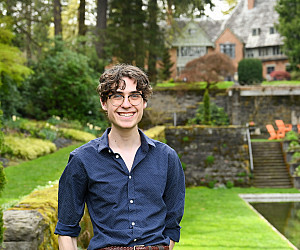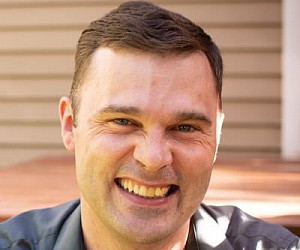main content Bringing Empathy to Health Care Through Narrative Scribe Training

Lewis & Clark is one of the first institutions of its kind to offer Narrative Scribe Training as part of its health studies minor. The idea of a “narrative scribe” in the context of health care is a relatively new concept that is still being developed by the college’s Center for Community and Global Health in partnership with the Northwest Narrative Medicine Collaborative. The practice falls under the greater umbrella of narrative medicine, which emphasizes listening to stories of illness and health, and improving relationships between patients and clinicians.
The question of how narrative scribing will be applied in the health care setting remains open-ended, but as a set of tools, the potential is almost limitless. The vision is for doctors, nurses, front-desk workers, and medical scribes to be able to apply its tenets to the elements of interpersonal communication in their respective positions.
“Lewis & Clark’s Center for Community and Global Health brings together multidisciplinary perspectives that give us an appreciation for healing in many forms,” says Alexis Rehrmann, the center’s community engagement coordinator and member of the Northwest Narrative Medicine Collaborative. “Narrative Scribe Training is a multidisciplinary approach—it includes stories from patients and practitioners, and makes space for the personal, the professional, and the academic to sit together.”
Last year, with the support of the Andrew W. Mellon Foundation grant, Lewis & Clark held its first Narrative Scribe Training with the Northwest Narrative Medicine Collaborative, which gave participants a unique opportunity to explore their understanding of medicine, illness, and treatment. The training was widely regarded as a success, with students reporting a new appreciation for the intersection of health care and the humanities, and the way that storytelling can help to heal.
This year’s training was titled “Signal and Noise: Scribing in the Margins.” Participants included Lewis & Clark students, University of Washington students, Oregon Health & Science University pre-med students, and medical scribes. While many participants joined with aspirations of working in the health care industry, the training was open to all with an interest in health and healing.

Edie Tavel BA ’23, a sociology and anthropology major, attended the training as part of the Narrative Medicine Practicum, a course taught by Daena Goldsmith BS ’86, professor of rhetoric and media studies. For Tavel, the training fit neatly into her interests in creative writing and medical anthropology. It also allowed for greater insight into an evolving field.
“What I found most powerful about the training was the focus on listening, writing, and knowing how to respond to people’s stories, because these skills are applicable to situations far beyond the medical setting,” Tavel says. “It was inspiring to share space—even a virtual space—with people coming from so many places and backgrounds, each bringing their own ideas and perspectives to what narrative medicine is and can be.”
Emma Krall BA ’25 enrolled in the training because she was drawn to the concept of amplifying patient voices in a setting that is often dominated by medical jargon. Before the training, Krall attended Rehrmann’s Introduction to Narrative Medicine workshop, an event that incorporated poetry writing and broadened the scope of what is possible in storytelling and health care.
“I am training to become an EMT and would love to have a narrative medicine lens in my treatment processes,” Krall says. “The narrative scribe training will be really valuable in pursuing a future of empathetic medicine, and I am grateful for the opportunity to pursue this interest.”
More Stories

National Award
Finn Watson BA ’26 Wins Goldwater Scholarship
Watson is one of 441 students selected from a pool of more than 5,000 nationwide for the Barry Goldwater Scholarship, the preeminent award for undergraduates in the natural sciences, engineering, and mathematics.

New Leadership
Andrew Saultz Selected Dean of the Graduate School
Andrew Saultz, an alumnus of L&C’s Master of Arts in Teaching program, begins his tenure on August 4.

Stronger Together
Lewis & Clark and Albina Vision Trust Launch Historic Partnership
The new collaboration will build a hub for education and economic opportunity within Portland’s redeveloped Lower Albina district to foster learning as a core value of the community and provide opportunities for Albina residents and Lewis & Clark students, staff, and faculty.

Big Winners
Speech and Debate Shines at National Tournaments
Lewis & Clark’s speech and debate program won a pair of championships at recent national tournaments. The team of Maltin Tocani BA ’25 and Isabella Moore BA ’26 won the Honors division at the YODL national British Parliamentary debate championships, while the Lewis & Clark contingent at the National Speech Tournament won the team title in the limited entry category.
